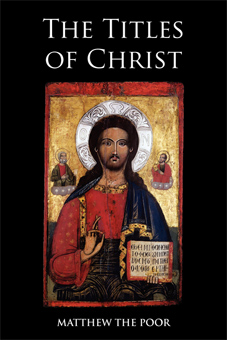THE TITLES OF CHRIST

by Matthew the Poor
Paperback (May 2008)
ISBN: 978-1-933275-21-5
Price: $18.95 + S&H (USD)
Father Matthew the Poor (Fr. Matta El-Meskeen), the well known Coptic Orthodox Abbot of the St. Macarius Monastery from the deserts of Egypt, has fallen asleep in the Lord; however, he has left behind a great legacy. He labored to preserve so zealously the holy tradition of the Gospel as it was expounded by the early spiritual masters, like the Great Anthony, the professor of the desert, and the great ecumenical teachers, like St. Athanasius and St. Cyril. This book expounds the rich meaning of the person of the Blessed Lord of all humanity, who has offered Himself for all and wants all to be one. Father Matta's book will help every reader to return to the Lord who created us and who invites us to a perfect salvation and eternal life.
ABOUT THE AUTHOR
Father Matta is not unknown to the American public. Time magazine wrote twice about him in December 1975 and April 1976. St. Vladimir Seminary Press published a collection of his articles entitled The Communion of Love. Recently, Orthodox Prayer Life, already published in English, was also been published in French and Italian.
Father Matta el-Meskeen, born in 1919 into a middle class family, studied pharmacy and earned a bachelors degree in 1944.
Two years later, in 1948, as he felt God's call to leave everything and take up the monastic life, he sold the pharmacy he owned, gave its money to the poor, and joined the Monastery of St. Samuel the Confessor, at that time the poorest monastery in the Western Desert of Upper Egypt. He was the first Egyptian university graduate to become a monk in the Coptic Orthodox Church. Transferred to the Monastery of the Virgin Mary Al-Seryian in Wadi El-Natroun (the ancient Desert of Scete) in 1950, he was entrusted by the Bishop of the Monastery to lead the community of monks as their spiritual father.
In 1954, he was chosen as Vicar of the Coptic Patriarch in Alexandria. However, he resigned after 18 months only to return to his seclusion. Due to some problems in the Monastery, he went back in 1956 to his original monastery in Upper Egypt, followed by his disciples the monks (12 monks). Later, they preferred to live as hermits deep in the open wilderness of the Western Desert, 60 kilometers beyond the Fayoum, known as Wadi El-Rayyan. There they dug caves in the rocks to live in, imitating the ancient anchorites of the early centuries of monasticism. There they lived for ten years, during which time Fr. Matta wrote prolifically. Many inspiring spiritual books were written by him during this period.
After the lapse of ten years, the Coptic Pope asked Father Matta in 1969 to join the Monastery of St. Macarius in Wadi el-Natroun, which was falling into ruins. St. Macarius Monastery is one of the most ancient monasteries of Egypt. Its founder, St. Macarius the Great (or the Egyptian) was the first monk to inhabit the wilderness of Scete. He founded the monastery in A.D. 360.
That twelve monks should together join the monastery was certainly a historical event in the life of the monastery, inhabited by only six elderly monks. Thereupon began a spiritual and architectural revival in the monastery. Today the number of monks exceeds 120, most of whom are university graduates.
To date Fr. Matta has published more than 100 books dealing with all aspects of religious life. They include more than 15 volumes (some 800 pages each) of Biblical commentaries on the books of the New Testament. There are his earlier books on Orthodox prayer life, Coptic Monasticism, the Eucharist and liturgy, St. Athanasius of Alexandria — Biography and teachings (800 pages), Church seasons and feasts, the Holy Spirit, the History of Israel, the New Creation of Man (2 volumes) and the Life and Works of Christ, and more. His writings also include works dealing with social issues such as Birth Control, Women's Rights and Obligations, Church and Politics, as well as hundreds of articles and taped sermons.
He has profoundly influenced monastic daily life, linking it with hard work and production for the good of society. This has taken place in the fields of agriculture and desert reclamation. Through these, the monk has achieved self-sufficiency thus eliminating any claim that he is a burden to society. At the same time, he maintains his solitude away from the world.
He was the first to discuss the relations between the Eastern and the Oriental Orthodox Churches with the Metropolitan George Khodr of Lebanon in 1960 where this was the first step to begin the unofficial consultations between the two Orthodox families after 1,500 years of separation.
PUBLICATIONS


